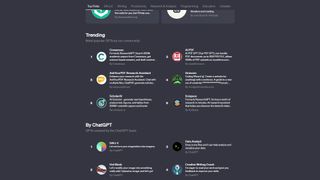ChatGPT is getting the equivalent of the App Store – here are the best early GPTs
OpenAI has officially launched its GPT Store, allowing select users and official partners to share custom chatbots with the community.
The platform will not be available to the general public, according to the company You will need to have a subscription to ChatGPT Plus ($20 / £16 per month), Enterprise or the newly formed Teams plan. Once you purchase the subscription, you get access to a variety of GPTs across multiple categories. These include writing, programming and art generation – some even provide lifestyle advice. One in particular can help you refine designs for a tattoo you’re considering getting.
The GPT Store was originally announced last November at the company’s first DevDay conference. It was shown alongside OpenAI’s then-new create-a-chatbot service. The store was scheduled to open later that month but was postponed several times, most likely due to the sudden resignation and reinstatement of CEO Sam Altman.
Curated chatbot
While the average person can’t try out chatbots, you can visit the store page now to see what’s available. Make sure you are not logged into your account: if you are, you will receive a message asking you to subscribe to ChatGPT Plus. OpenAI will highlight four GPTs at the top of the page each week. At the time of writing, AllTrails, Consensus, Code Tutor, and Books are recommended.
The first, AllTrails, will suggest nature trails for you to explore. Consensus, formerly known as ResearchGPT, has access to 200 million academic articles and can answer your tough scientific questions. Code Tutor, developed by education platform Khan Academy, looks at your recently created computer code and makes suggestions to improve it. Finally, there are books, the most mysterious of the bunch. Its description is quite vague, but if we had to guess what it does, we’d say it provides book recommendations.
Below are some other lists highlighting the chatbots that are currently popular within the community and the chatbots created by OpenAI’s internal team. There are plans to implement an income program that will allow people to make money from their creations. Creators are “paid based on user engagement” with their chatbots. Details are light at the moment. All that is currently known is that it will launch in the United States sometime in the first quarter of 2024.
Follow the rules
Anyone with a subscription can create a GPT. OpenAI states that you don’t need any coding skills, although you should follow along usage policy And brand guidelines. It wants to keep things clean.
You can read the rules on the official website, but to give you an idea: users cannot A) compromise people’s privacy, B) create an AI that can harm the well-being of others, or C) use the platform to spread disinformation. If you break the rules, the company will limit your ability to share or monetize your work. If you come across one of these imposters in the GPT Store, OpenAI will ask you report them.
If you have a creation, you can share it by first saving your GPT and then selecting Everyone. This gives all people on the platform access. Once you’re done, you’ll need to “verify your builder profile” in the Settings menu. After you’ve done all that, you should see your chatbot in the store.
Check out Ny Breaking’s list of seven tips for ChatGPT beginners. That generative AI can be a bit tricky to use.

